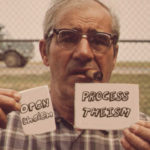We run our website the way we wished the whole internet worked: we provide high quality original content with no ads. We are funded solely by your direct support. Please consider supporting this project.
What is the significance of Psalm 106:23?
“Therefore he said he would destroy them—
had not Moses, his chosen one,
stood in the breach before him,
to turn away his wrath from destroying them.”
Moses (on several occasions, we have seen) persuaded God to change his mind regarding his plan to judge Israel. This inspired verse explicitly says that God “would destroy them…had not Moses…stood in the breach.” If God always foreknew that Moses was going to stand in the breach and thus that he wasn’t going to destroy Israel, can we avoid concluding that his declaration to Moses that he was going to destroy Israel was somewhat duplicitous? If the outcome was eternally known to God, can we avoid getting the impression that he was playing a Machiavellian game with his prophet?
If we trust that God is above such antics, however, we must accept the straightforward meaning of this verse. Accepting this view has the added advantage of accentuating the importance and urgency of intercessory prayer in a way that is, I believe, impossible if we believe the future is exhaustively settled in God’s mind (cf. Ezek. 22:29–31).
Category: Q&A
Tags: Open Theism, Q&A
Topics: Open Theism
Verse: Psalm 106
Related Reading

Process Theology & Open Theism: What’s the Difference?
Question: When ReKnew talks about Open Theism is it a mistake for people to equate it with Process theology, and if so what are the defining differences? I guess I am starting to lean toward Dr. Boyd’s thoughts for all things theologically egg-heady, so I thought I would ask the question. Your ministry has been freeing…

What is the warfare worldview?
The warfare worldview is based on the conviction that our world is engaged in a cosmic war between a myriad of agents, both human and angelic, that have aligned themselves with either God or Satan. This is the view that is presupposed throughout the entire Bible, and it’s especially evident in the New Testament. For…

How can you put your trust in a God who’s not in control of everything?
Question: I read your book Is God to Blame? and found it to be very compelling. It’s rocking my world. But I’m also finding I’m now having trouble trusting God like I used to. I used to believe that God ordained or at least foreknew all that was going to happen. Now I’m questioning this, and I’m wondering…

How do you respond to Acts 4:27–28?
The Christians in Jerusalem proclaim to the Lord, “…both Herod and Pontius Pilate, with the Gentiles and the peoples of Israel, gathered together against our holy servant Jesus… to do whatever your hand and your plan had predestined to take place.” This passage tells us that Herod, Pilate, the Gentiles and the peoples of Israel…

Neo-Molinism and the Infinite Intelligence of God
Classical Molinism holds that, since God is omniscient and knows all truths, he knows not only what every agent will do in the future, but also what every agent would have done in every other “possible world.” In this essay I argue that classical Molinism overlooked a whole category of truths that an omniscient God…

When God Discovers
Scripture consistently portrays God’s knowledge as conforming to the ways things really are, and part of the way things really are is temporally conditioned. Scripture never expresses the commonly-held sentiment that time is somewhat illusory. God “remembers” the past and anticipates the future. Insofar as he empowers humans to freely determine the future, this means…
